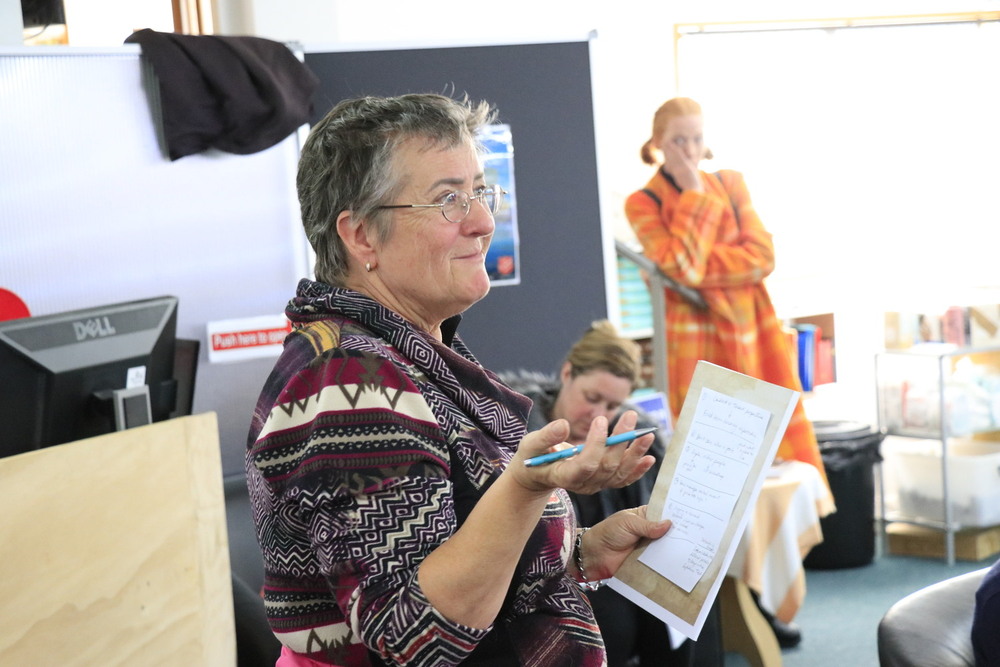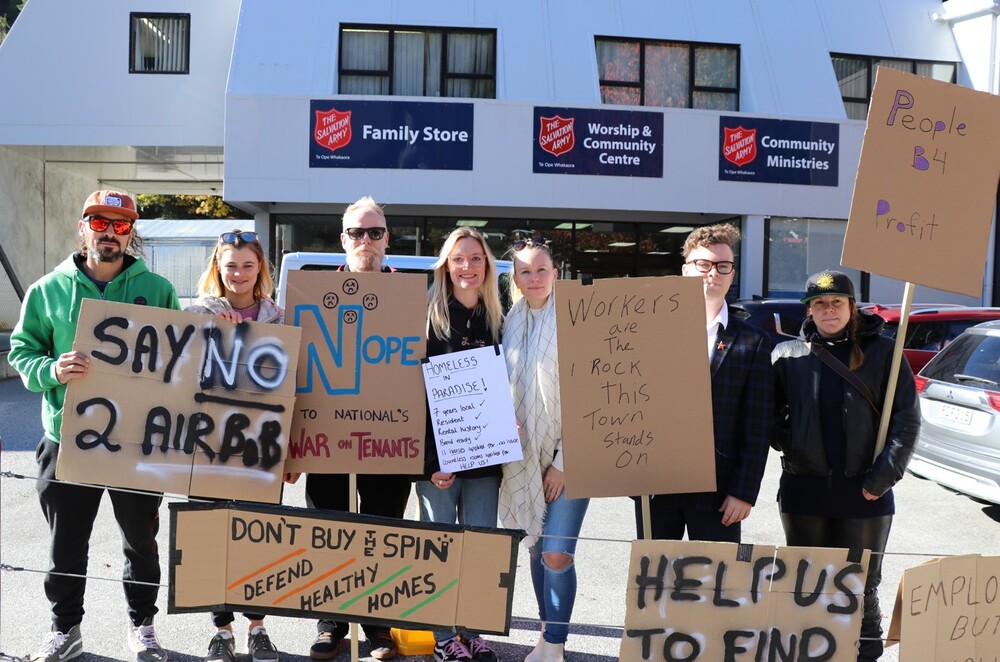National plans to make it easier for landlords
Queenstown App
27 April 2023, 9:54 PM
 Chris Bishop, right, with Queenstown's MP Joseph Mooney
Chris Bishop, right, with Queenstown's MP Joseph MooneyNational has pledged to roll back changes to tenancy legislation if elected, to help ease the housing crisis.
Chris Bishop, the National Party's housing spokesperson, in a fiery Queenstown public meeting on Thursday (April 27), announced two new policies aimed at making it more attractive for property owners to become landlords.
If elected in October, they will amend the Residential Tenancy Act to bring back the ability for landlords to issue 90-day termination notices to their tenants.
And they will make another change to ensure fixed tenancies do not automatically roll over to become periodic tenancies.
"The way it works at the moment is landlords essentially have to have a reason to end the tenancy, whether they're moving into the property or they're doing renovation, for example," Chris said.
"The effect, unfortunately, has been that many landlords ... have just said it's all too hard, I'm out, I don't want to be involved in this anymore. Landlords have decided they don't want to offer properties into the rental market.
"Now, do we want to build more homes for first time buyers? Yes. Do we want more supply of housing in Queenstown? Absolutely. Do we need landlords in Queenstown? The answer is yes, we do. Because when we don't have enough landlords, rents go up, and there aren't enough houses for people to live. That's why rents in Queenstown went up $150 on average last year alone."
National had already pledged to reinstate mortgage interest deductibility for landlords and reverse changes to the Brightline test, which would mean landlords can sell a property after two years without paying capital gains tax. Labour had increased it to 10 years.
The four policies would effectively just repeal changes Labour made to the RTA two years ago.
Around 50 people packed into the Salvation Army building on Gorge Road in Queenstown to hear the announcement, some who were either homeless or had homeless friends as a result of Queenstown lakes' rental crunch. They included organisers and attendees of last month's protest on Marine Parade.
Many questioned National's stance, including Simon Edmunds, of the Queenstown Workers Collective, who was one of the most vocal critics, prompting Chris Bishop at one point to label him a "left-wing activist".
"I know that you are the party of landlords, but they're not the group that you need to step in and help," Simon said.

Simon Edmunds (red checked jacket), of the Queenstown Workers Collective
"The people that need protecting in town at the moment are tenants and to say that basically making landlords richer by stopping them paying tax with Brightline, with interest deductibility ... well, workers pay tax in this town, why shouldn't landlords on the rent they earn?
"To blame the housing crisis somehow on landlords not being rich enough, so your solution is basically to make it easier to make more money as a landlord. That's pretty sick."
Simon also said Chris was "assiduously avoiding" mentioning the "elephant in the room", Airbnb, a comment which drew some applause and vocal support from the crowd.
Chris countered that it was all about balance, finding the right balance between landlords and tenants.
He said Airbnb is something he is prepared to look at.
"I acknowledge that in particular markets like Queenstown, Airbnb presents challenges. Again, I'll go back to the balance, we've got to be careful, as well, because Airbnb and other similar accommodation providers help the Queenstown economy," Chris said.
Many of the district's businesses have taken it upon themselves to provide worker accommodation, either by buying property or taking on leases.
But Ellen Murphy, of Wolf Hospitality Group, told Chris some landlords were now taking advantage of this, hiking up rents for corporate tenancies.
The company was being asked to pay around $1700 per week for a four-bedroom house in Fernhill.
"Now that companies are willing to rent, they're putting the rents up, pricing out the individuals again," Ellen said.
She called for rent restrictions but Chris said it was ultimately a supply issue.
"When you've got diminished supply of rental properties on the market, landlords have all the market power ... they'll charge what the market can bear," Chris said.
More supply means lower prices, and more supply is the aim of National's four policies.
Other stories were more personal.
Kim Knight highlighted the problems single people and older people face in the rental housing market.
"It seems to me that most pricing is just assuming that it's going to be a couple or two people who can share a room," she said.

Kim Knight at the meeting
"That's a big issue for someone who is single. Even a room is getting expensive now.
"And another issue is people who are in their 20s and 30s don't want to share a house with someone who's 60-plus."
Kim said she can't find anywhere to live and has been housesitting for the past six months, moving every two weeks, living in 15 places.
"You don't have the emotional and physical resilience of a 20-to-30-year-old, and accuse my French, it's f***king hard," she said.
"I would like to see the Government pay more attention to helping people in this sort of situation."
Generally, there was anger from many in the audience at the lack of immediate action to help people, especially those living in cars and tents with winter approaching.
Ashley Munn, verging on tears, said there's a need to "morally shame" people who don't put their properties up for rent.
"They need to feel the shame that these people are homeless, and they can do something about it," she said.
"Your points are good points and they might work," she told Chris, "but what are you going to do in the meantime, because someone is going to die before this Government actually does something?"
There were also calls for more social housing and emergency housing in Queenstown and many asked for a cap or outright ban on Airbnb.

Protestors outside Thursday's meeting
Chris said there is a lot more Government can do with regards to community social housing.
The waiting list is 23,000 families around the country, he said, with 3500 families living in motels, with an average stay of six months.
He said there's a need to make it easier for landlords, which will help tenants, along with building more social community housing, more affordable housing, lower land costs, and making it easier to build.
"My overall point is that there's not one single thing we can do to fix New Zealand's housing crisis, we have to do a whole bunch of things, and it will take a bit of time," he said.
Both he and Queenstown MP Joseph Mooney agreed with the need for a short-term solution but said it was up to the Labour Government and Queenstown Lakes District Council to take action, as National's powers were limited while in opposition.






